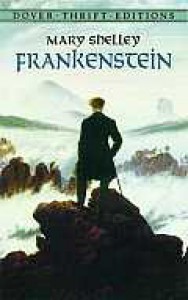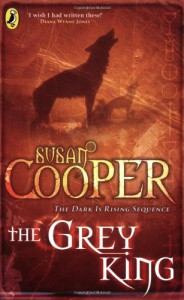Currently reading
The Sound and the Fury
The Last Man
In Search of Walid Masoud (Middle East Literature in Translation)
A Night Like This (Smythe Smith Quartet 2)
 Two mentally unbalanced enemies? Isn't that gilding the lily? This author usually has a sure hand on the balance of froth and seriousness, but she seems to have lost control in this one.
Two mentally unbalanced enemies? Isn't that gilding the lily? This author usually has a sure hand on the balance of froth and seriousness, but she seems to have lost control in this one.
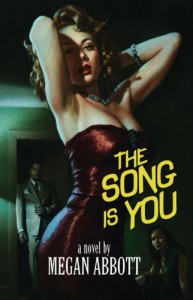 Fantastic noir, great characters. Abbott does exceptional hard-bitten women. Not a pleasant book, being all about the worst of human behaviour, but well written story about a sleazy Hollywood PR fixer having a crisis of conscience he desperately doesn't want to have. Lots of stuff for those with a love of genre and period. This is my second Abbott book. Looking forward to reading all her work.
Fantastic noir, great characters. Abbott does exceptional hard-bitten women. Not a pleasant book, being all about the worst of human behaviour, but well written story about a sleazy Hollywood PR fixer having a crisis of conscience he desperately doesn't want to have. Lots of stuff for those with a love of genre and period. This is my second Abbott book. Looking forward to reading all her work.
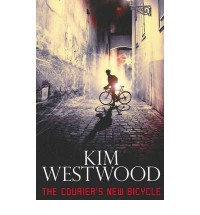 What I liked the most about this book was any strong gender expression was performative. For some reason not made explicit in the book, characters kept asking Sal to find things out for them. Frankly, Sal was not good at this. Things happened. Sal was there to notice them, or not as the plot went. The renaming of Melbourne's streets and landmarks was more distracting than anything else, one of those world-building tricks a writer distracts themselves with when they're blocked. A fun, fast read.
What I liked the most about this book was any strong gender expression was performative. For some reason not made explicit in the book, characters kept asking Sal to find things out for them. Frankly, Sal was not good at this. Things happened. Sal was there to notice them, or not as the plot went. The renaming of Melbourne's streets and landmarks was more distracting than anything else, one of those world-building tricks a writer distracts themselves with when they're blocked. A fun, fast read.
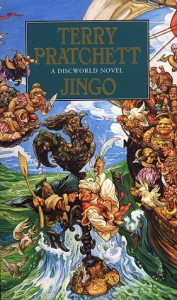 Takes a bit to get going, the set up is a bit boring. This is one of the ones that feels a little unfinished or too full or something. Nobby continues to be a brilliant character.
Takes a bit to get going, the set up is a bit boring. This is one of the ones that feels a little unfinished or too full or something. Nobby continues to be a brilliant character.
Snuff [Discworld]
 Splendid but with all the usual Pratchett problems so if you've got issues, you'll still have them. If you don't, if you love Sam and Sybil et al, you will enjoy this. Young Sam is six now and his characterisation is great, he feels like a real little kid and is mostly a sensible part of the goings on, not an overly cute and therefore annoying kid.
Splendid but with all the usual Pratchett problems so if you've got issues, you'll still have them. If you don't, if you love Sam and Sybil et al, you will enjoy this. Young Sam is six now and his characterisation is great, he feels like a real little kid and is mostly a sensible part of the goings on, not an overly cute and therefore annoying kid.
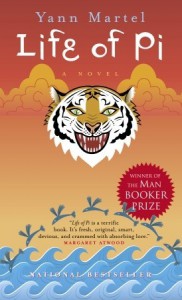 I didn't particularly like this book and I'm not particularly interested in exploring why. It's a competent work and the reveal is heartbreaking and ratchets up the horror of the disaster that befalls Pi. I skimmed the final third. I think for me there was too much horror and too little of something I can't quite define. A firmer link between the parts of the story, perhaps? Or maybe I just don't have the desire to give the book the thinking it needs to reap its rewards? My advice is read other reviews before you decide not to read it based on this. I'm sure there's a reason it was very popular.
I didn't particularly like this book and I'm not particularly interested in exploring why. It's a competent work and the reveal is heartbreaking and ratchets up the horror of the disaster that befalls Pi. I skimmed the final third. I think for me there was too much horror and too little of something I can't quite define. A firmer link between the parts of the story, perhaps? Or maybe I just don't have the desire to give the book the thinking it needs to reap its rewards? My advice is read other reviews before you decide not to read it based on this. I'm sure there's a reason it was very popular.
 Awful attitudes are so fore-fronted in this book, so much so that nostalgia can't save it. Sacrifice lauded above all common sense, women are bitter and/or tragic old maids without a man, and the overt racism, which in a lot of Montgomery is by omission as she much prefers to write about her white main characters, is the core of one story about - you guessed it - one woman's redemption through sacrifice and another's long, lonely man-less life.
Awful attitudes are so fore-fronted in this book, so much so that nostalgia can't save it. Sacrifice lauded above all common sense, women are bitter and/or tragic old maids without a man, and the overt racism, which in a lot of Montgomery is by omission as she much prefers to write about her white main characters, is the core of one story about - you guessed it - one woman's redemption through sacrifice and another's long, lonely man-less life.
 A fun book, but not one for the tender stomached. Julie Powell is a writer who likes to shove disgusting things at the reader, like a toddler with a keyboard. And I don't mean preparing lobsters.
A fun book, but not one for the tender stomached. Julie Powell is a writer who likes to shove disgusting things at the reader, like a toddler with a keyboard. And I don't mean preparing lobsters.
 It's not easy to write about childhood favourites in other than glowing terms. I can see all the things I would criticise - even dislike - had I first read this book now. The overwhelming heteronormativity, the association of singlehood with a poorer, less worthwhile life, the demonstration that any woman who says she doesn't want to marry is lying both to herself and everyone else, that women are the houseworkers and that a man who cleans house is an oddbod, rare and remarkable, but laudable if he is a single dad. On the other hand, I love these stories. They make me happy.
It's not easy to write about childhood favourites in other than glowing terms. I can see all the things I would criticise - even dislike - had I first read this book now. The overwhelming heteronormativity, the association of singlehood with a poorer, less worthwhile life, the demonstration that any woman who says she doesn't want to marry is lying both to herself and everyone else, that women are the houseworkers and that a man who cleans house is an oddbod, rare and remarkable, but laudable if he is a single dad. On the other hand, I love these stories. They make me happy.
 One of those books whose images stay with you but gosh, I didn't care. I just didn't care. Read this review instead. I was describing it to a friend and she said, oh, a grade twelve book. By which she meant a book you're assigned to study in high school.
One of those books whose images stay with you but gosh, I didn't care. I just didn't care. Read this review instead. I was describing it to a friend and she said, oh, a grade twelve book. By which she meant a book you're assigned to study in high school.
 It's a pity that this last book is relatively weak. Jane, Simon, Barney and Merriman have come all the way to Wales for climax of the series and, instead of some adventures with them, we get pages and pages and pages of Cooper's imaginative lost land. Yes, it's lovely. Yes, it would be great in the graphic novel. Cooper, who is so good at keeping action happening seems to drop the ball here.
It's a pity that this last book is relatively weak. Jane, Simon, Barney and Merriman have come all the way to Wales for climax of the series and, instead of some adventures with them, we get pages and pages and pages of Cooper's imaginative lost land. Yes, it's lovely. Yes, it would be great in the graphic novel. Cooper, who is so good at keeping action happening seems to drop the ball here.





